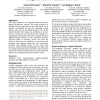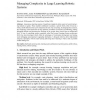443 search results - page 21 / 89 » Lazy learning for control design |
109
click to vote
FSKD
2007
Springer
15 years 8 months ago
2007
Springer
Evidence theory has been widely applied to uncertainty reasoning. In this paper a finite state machine with evidential reasoning is proposed to control autonomous robots. The Khep...
CHI
2002
ACM
16 years 2 months ago
2002
ACM
This study examines a novel interface design for heavilyfeatured productivity software. The design includes two interfaces between which the user can easily toggle: (1) an interfa...
89
Voted
CHI
2008
ACM
16 years 2 months ago
2008
ACM
This work-in-progress report presents the groundwork for the design of a user-adaptive web-based e-learning system. A survey and two randomized controlled experiments were carried...
113
click to vote
ECAL
2005
Springer
15 years 7 months ago
2005
Springer
We present an example of the dynamical systems approach to learning and adaptation. Our goal is to explore how both control and learning can be embedded into a single dynamical sys...
117
click to vote
JIRS
2000
15 years 1 months ago
2000
Abstract. Autonomous learning systems of significant complexity often consist of several interacting modules or agents. These modules collaborate to produce a system which, when vi...


